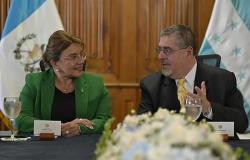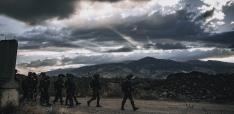Central America at a Crossroads: Is there a Democratic Path to Confront Violence?

As they struggle to overcome violence and insecurity, countries like El Salvador, Honduras, and Guatemala increasingly find themselves in a tense struggle between democratic ideals and authoritarian impulses. The region’s future may hinge on whether effective security policies can emerge without sacrificing fundamental freedoms.
The northern countries of Central America, El Salvador, Guatemala, and Honduras, exemplify the quagmire that defines much of Latin American politics and society today. Chronic insecurity, violence, and vulnerability have beset the region into a seemingly endless crisis. In response, many governments and citizens are increasingly tempted by a nefarious agreement: sacrificing hard-won democratic rights and institutions for the promise of security. Mano Dura policies are gaining traction, while democratic forces struggle to offer viable alternatives. Governments from El Salvador, under a more comprehensive authoritarian project, and Honduras, driven by desperation amid declining popularity and rising violence, have both embraced the state of exception as a dominant mode of governance. Guatemala, meanwhile, grapples with a weakened democracy, seeking to avoid the authoritarian path while confronting violence. Trump’s return to the presidency of the U.S. is likely to further push the subregion toward authoritarianism.
Exception turned into normality: El Salvador and Honduras
In early October, both El Salvador and Honduras extended their states of exception. For El Salvador, this marked the 31st extension since its inception in March 2022. The state of exception is the central pillar of a coercive pacification strategy, characterized by the suspension of fundamental constitutional rights, mass incarceration, and persistent military and police raids aimed at dismantling gangs. The immense popularity of the strategy enabled President Bukele’s re-election in February 2024, solidifying the path to his authoritarian rule. As analyses have warned, the state of exception does not prioritize the safety of Salvadorans, but rather is a central piece in the authoritarian project headed by Bukele. Under its guise, the government has suppressed dissent, silenced the press, and persecuted social movements and grass-roots leaders.
Beyond the crackdown in gangs, the government has not provided a solution to the everyday life struggles that most of the population faces. What is more, welfare provision has been reduced, while the government has focused on shaping the country as ideal destination for foreign investment, at times at the cost of undermining political rights. This fact is also highlighted in the 2024 Bertelsmann Transformation Index (BTI), which tracks a steep and sudden decline in areas such as “assembly rights” and “freedom of expression”.
As Bukele’s model gains popularity in other countries in the region, notably Argentina, Costa Rica and Ecuador, there appears to be no realistic alternative to the ongoing consolidation of an autocratic regime.
Xiomara Castro came to power in Honduras pledging a fresh start for the nation. Yet, the country remains plagued by severe and complex security challenges. MS-13 and the 18th Street gang continue to exert significant control, particularly in the outskirts of Tegucigalpa and San Pedro Sula, with evidence suggesting their expansion to coastal areas and border zones near Guatemala and El Salvador. Honduras also faces escalating issues related to drug trafficking. Criminal groups, including gangs, dominate this trade, and reports point to a growing trend of coca cultivation within the country, which has historically served as a transit hub for drug shipments.
Initially, Castro committed to sweeping reforms in security policy and institutions, including reducing the military’s role in public safety, strengthening the police force, promoting community-based crime prevention, and tackling corruption. However, this approach shifted dramatically amid rising concerns over extortion, tensions with Congress, and fears of waning public support. Emulating her Salvadoran counterpart, Castro declared a “war against crime” and imposed a state of exception in Tegucigalpa and San Pedro Sula. Since its implementation, this measure has been repeatedly renewed by Congress and extended to other regions of the country.
Despite these efforts, the strategy has failed to achieve its objectives. While less brutal than El Salvador’s approach, the state of exception and ensuing measures have resulted in widespread human rights violations and further militarization of security efforts. Gangs’ activities have expanded beyond their traditional strongholds, and crimes such as extortion and violence against civilians continue unabated. Meanwhile, tensions between the branches of government have been escalating. In recent months, President Castro has accused the armed forces, members of Congress, and local organizations of conspiring behind a coup plot. This charged atmosphere has fueled concerns about potential violence and heightened polarization in the upcoming 2025 electoral cycle, when the country will elect a new president, members of Congress, and mayors.
A beacon of hope: Guatemala and a democratic pathway to security
The election of Bernardo Arévalo and his party, Movimiento Semilla, to Guatemala’s presidency—despite concerted efforts to obstruct both the electoral process and his inauguration—provides a glimmer of hope for democratic governance. Arévalo’s campaign and policy agenda have placed a strong emphasis on addressing systemic corruption. Nevertheless, the pervasive issue of criminal violence remains an urgent and critical challenge. President Arévalo recently unveiled his security policy, which aligns with the principles of democratic security outlined in the 1996 Peace Accords. The policy prioritizes human rights, the rule of law, and the well-being of the Guatemalan people. To achieve these goals, it proposes comprehensive reforms to the security sector, including the professionalization of security forces and the strengthening of investigative and intelligence capabilities. The policy’s implementation certainly faces significant hurdles, including the resistance of anti-democratic civil and military elites. However, if realized, it could set a new model for democratic security.
This multifaceted approach stands in stark contrast to Mano Dura strategies, particularly Bukele’s version. While Arevalo’s policy emphasizes violence prevention, addressing the root causes of violence, and strengthening democratic institutions, Bukele’s strategy relies on suspending and limiting constitutional rights and freedoms, introducing discretionary offenses alongside expanding existing ones, concentrating power in the executive branch, enacting massive incarcerations, and militarizing public security. Whereas Arevalo draws on the 1996 Peace Agreement as a guiding framework for understanding security, Bukele has openly criticized the 1992 Peace Accords, dismissing them as a farce. It is reasonable to assert that Guatemala and El Salvador currently represent the extremes of opposed approaches to addressing the security crisis in the region.
The implications of Trump’s return to the White House
The experience with the first Trump administration’s, coupled with his planned emphasis on anti-immigration policies, particularly mass deportations, for his second term, does not bode well for democratic development in Central America. In his first term, Trump threatened to withhold hundreds of millions of dollars in aid and limit trade with El Salvador, Guatemala, and Honduras unless they stopped their citizens from seeking asylum at the U.S.-Mexico border. He also signed asylum cooperation agreements with these countries, enabling U.S. immigration officials to send asylum seekers back to their home countries before they could apply for refuge in the U.S. Additionally, Trump suspended programs aimed at fighting corruption and supporting vulnerable communities in the region. While the current landscape is fraught with uncertainty, Trump’s arrival appears to give further impetus to authoritarian security policies.
Viviana García Pinzón, Arnold-Bergstraesser-Institute (ABI) Freiburg and Institute for Latin American Studies at GIGA, Senior Researcher and Associate.
This first appeared on the Bertelsmann Stiftung Index blog and was reposted with permission.
Image: Bernardo Arévalo receives Xiomara Castro, photo by Presidency of Guatemala via Wikimedia Commons, Public Domain, https://creativecommons.org/publicdomain/mark/1.0/.


